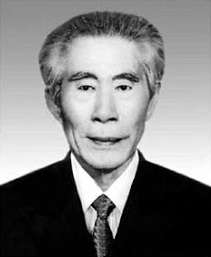Ri In-mo
Ri In-mo[2] (Korean: 리인모; 24 August 1917[3] - 16 June 2007)[4] was an Unconverted long-term prisoners from the Democratic People's Republic of Korea (North Korea). He spent 40 years in prison and under restriction of freedom in the Republic of Korea (South Korea).
Ri In-mo | |
|---|---|
 | |
| Born | 24 August 1917 |
| Died | 16 June 2007 (aged 89) |
| Nationality | North Korean |
| Known for | Unconverted long-term prisoners jailed by the Republic of Korea (South Korea) |
| Ri In-mo | |
| Chosŏn'gŭl | 리인모 |
|---|---|
| Hancha | |
| Revised Romanization | Yi In-mo |
| McCune–Reischauer | Ri In-mo |
| [1] | |
History
Described by the Korean Central News Agency as "well-known among the DPRK people as an incarnation of faith and will"[3] and "a pro-reunification patriotic fighter,"[5] Ri was born in 1917 in Kimhyonggwon County, DPRK. He was arrested by South Korean while fighting as a guerilla in the Jirisan[3] in January 1952 while serving as a war correspondent of Korean Peoples Army during the Korean War. Ri served 34 years in prison in South Korea.[6] Ri was offered his freedom in exchange for signing a form renouncing his political beliefs but he repeatedly refused.
Ri was released in 1988 but South Korean authorities continued to restrict his activities. He was repatriated to the DPRK in March 1993 and was reunited with his wife and daughter.[6] Following his repatriation, Ri was in ill health, apparently due to the conditions he experienced in prison.[3] He underwent medical treatment in the United States in 1996.[6] After his health improved, his suffering in prison was put into film by North Korea.[7] Ri's numerous public appearances made him popular in the North.[6] However, the film's mentions of hunger strikes – and therefore the suggestion that food in South Korean prisons was so abundant that one could go on hunger strike – had the undesired effect of suggesting to the North Koreans that life in the South Korean prisons were not as bad as believed.[7]
Ri died on 16 June 2007 and was given a hero's funeral.[6] His funeral committee was chaired by Kim Yong-nam with Choe Thae-bok as its vice-chairman and had 55 members including Kim Yong-il.[8] A statue was erected in his honour in Pyongyang the following year.[6]
Works
- Ri In-mo (1993). Incarnation of Faith and Will: Notes of Ri In Mo, Former War Correspondent of the Korean People's Army. Pyongyang: Foreign Languages Publishing House. OCLC 34912928.
- — (1994). A Withered Leaf Turning Green. Pyongyang: Foreign Languages Publishing House. OCLC 272460322.
- — (1997). My Life and Faith: Memoirs. Pyongyang: Foreign Languages Publishing House. OCLC 240638109.
See also
References
- "Yi, In-mo, 1917-". Linked Data Service Library of Congress. Retrieved 25 July 2015.
- Agency, Yonhap News, ed. (27 Dec 2002). North Korea Handbook. Seoul: M. E. Sharpe. p. 470. ISBN 9780765635235. Retrieved 18 April 2015.
- "Ri In Mo, Incarnation of Faith and Will". Korean Central News Agency. 13 February 2015. Archived from the original on 18 April 2015. Retrieved 18 April 2015.
- "Ri In Mo Passes Away". KCNA. 17 June 2007. Archived from the original on 12 October 2014. Retrieved 25 July 2015.
- "Learning from Spirit of Ri In Mo, Pro-reunification Patriotic Fighter, Encouraged in DPRK". Korean Central News Agency. 2 March 2015. Retrieved 18 April 2015.
- James Hoare (13 July 2012). Historical Dictionary of Democratic People's Republic of Korea. Scarecrow Press. p. 327. ISBN 978-0-8108-6151-0.
- Burdick, Eddie (26 May 2010). Three Days in the Hermit Kingdom: An American Visits North Korea. McFarland. p. 300. ISBN 9780786456536. Retrieved 18 April 2015.
- "Ri In Mo Passes Away". KCNA. 17 June 2007. Archived from the original on 12 October 2014.
Further reading
- Kim Il-sung (1999). "Talk with Ri In Mo: April 15, 1993" (PDF). Kim Il Sung: Works. 44. Pyongyang: Foreign Languages Publishing House. pp. 153–155. OCLC 827642144.